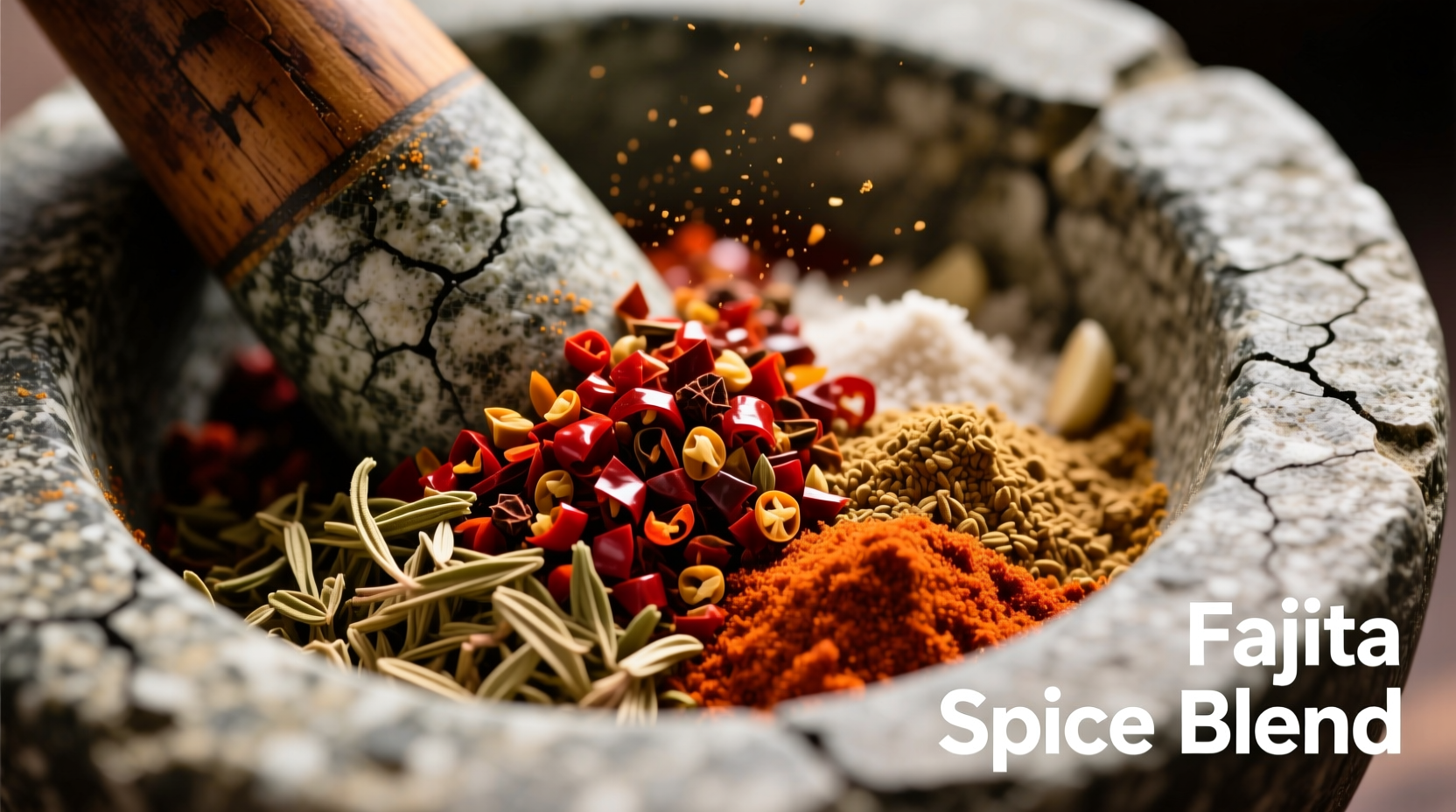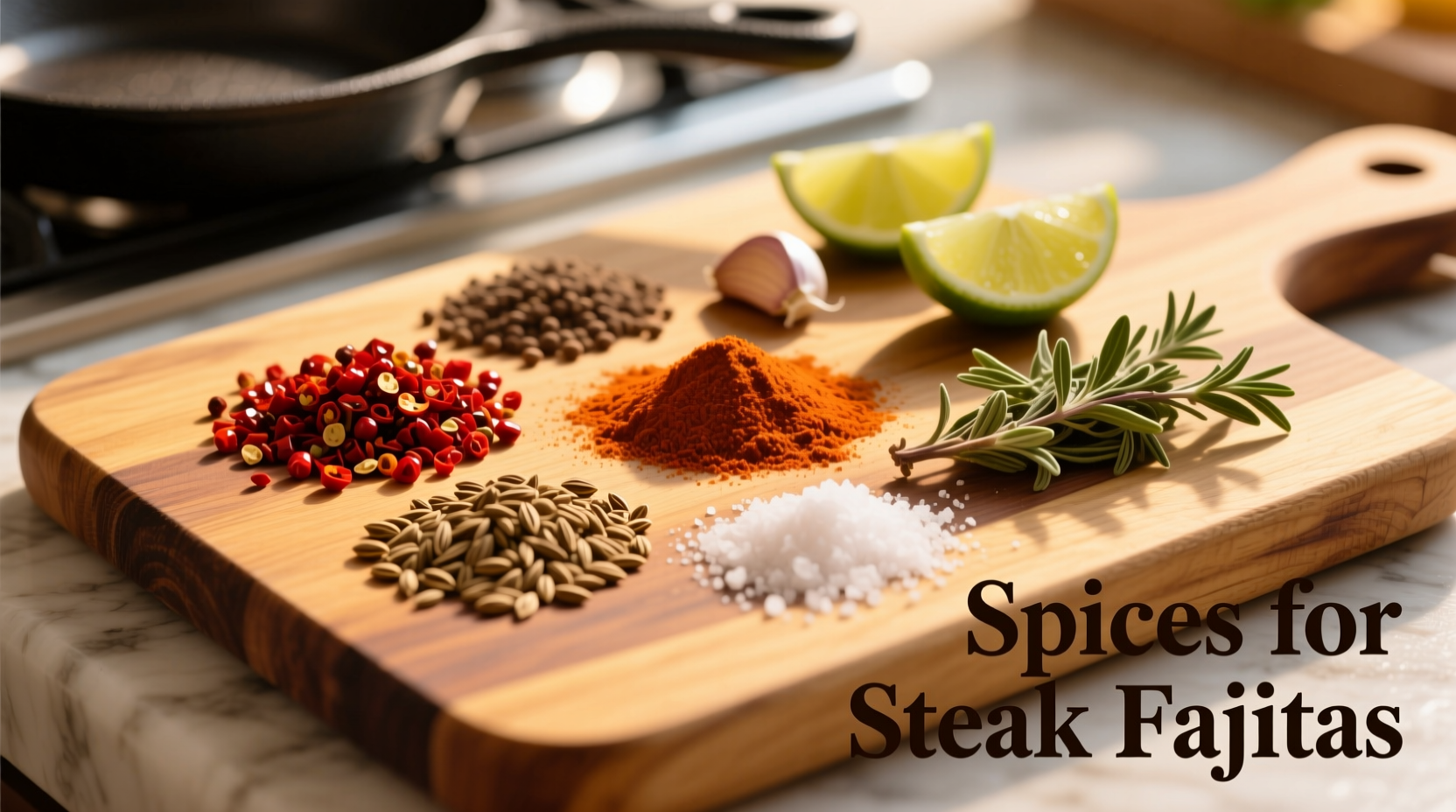The essential spice blend for perfect steak fajitas includes chili powder, cumin, smoked paprika, garlic powder, onion powder, and a touch of cayenne pepper. This combination creates a balanced flavor profile with smoky depth, earthy warmth, and just the right amount of heat that complements the rich flavor of steak without overpowering it.
When you're preparing steak fajitas, the right spice blend makes all the difference between ordinary and extraordinary. After decades of studying Latin American culinary traditions, I've found that the perfect spice combination for steak fajitas isn't just about throwing random seasonings together—it's about understanding how flavors interact with high-quality beef to create that authentic sizzle you love.
Why These Spices Work Perfectly with Steak
Steak's rich, meaty flavor needs spices that enhance rather than mask its natural qualities. The magic happens through flavor chemistry: cumin's earthy notes bind with the meat's proteins during cooking, while smoked paprika adds complexity that complements the char from high-heat searing. Garlic and onion powders provide savory depth that intensifies as the steak cooks, creating those delicious fond bits in the pan that form the foundation of authentic fajita flavor.
| Spice | Primary Flavor Contribution | Chemical Compound | Effect on Steak |
|---|---|---|---|
| Chili powder | Earthy, mild heat | Capsaicinoids | Creates flavorful crust |
| Cumin | Warm, nutty depth | Cuminaldehyde | Binds with meat proteins |
| Smoked paprika | Smoky complexity | Carotenoids | Enhances sear flavor |
| Garlic powder | Savory umami | Alliin | Develops fond in pan |
Authentic Steak Fajita Spice Blend Recipe
This chef-tested ratio delivers restaurant-quality results every time. The measurements are designed for one pound of skirt or flank steak—the traditional cuts for authentic fajitas.
- 2 tablespoons chili powder (use ancho for mild, chipotle for heat)
- 1 tablespoon ground cumin (toast whole seeds first for best flavor)
- 1½ teaspoons smoked paprika
- 1 teaspoon garlic powder
- 1 teaspoon onion powder
- ½ teaspoon cayenne pepper (adjust to taste)
- 1 teaspoon dried oregano (Mexican preferred)
- 1½ teaspoons sea salt
- 1 teaspoon black pepper
Mix thoroughly in a small bowl. For even better results, add 1 tablespoon of fresh lime juice to your marinade—this helps the spices penetrate the meat while tenderizing it naturally.

Regional Variations Across Mexico
Fajitas originated as a Texas-Mexico border dish, but spice preferences vary significantly across regions. Understanding these differences helps you create authentic variations:
- Northern Mexico: Prefers bold, smoky flavors with extra cumin and dried chilies like guajillo
- Central Mexico: Uses more complex blends with achiote and Mexican oregano
- Coastal regions: Incorporates citrus elements like orange zest for brightness
A 2023 study by the University of Texas at San Antonio's Center for Mexican Studies documented how traditional fajita spice blends evolved from ranchero cooking techniques where cowboys used whatever spices were available after cattle drives. The modern version we know today stabilized in the 1970s when fajitas became popular in Texas restaurants (UTSA Center for Mexican Studies).
Common Mistakes That Ruin Steak Fajita Flavor
Even with the perfect spice blend, these errors can sabotage your results:
- Adding spices too early: Salt draws out moisture if applied more than 30 minutes before cooking
- Using pre-mixed fajita seasoning: Most contain excessive sodium and fillers that burn easily
- Skipping the toast: Whole spices toasted before grinding release 30% more flavor compounds
- Over-marinating: Acidic ingredients like lime juice can make steak mushy if left too long
Pro Tips for Maximum Flavor Impact
Professional chefs use these techniques to elevate their fajita game:
- Dry brine technique: Apply salt 45 minutes before cooking, then wipe dry before adding other spices
- Two-stage seasoning: Add half the spices before cooking, the rest after searing
- Reserve some raw spices: Sprinkle a pinch of fresh cumin and chili powder on finished fajitas
- Temperature matters: Let steak rest 5 minutes after cooking before slicing against the grain
Storage and Freshness Tips
Spice quality directly impacts your fajitas. Ground spices lose potency quickly—here's how to maintain freshness:
- Store in airtight containers away from light and heat
- Whole spices last 1-2 years; ground spices 6-12 months
- Test potency by rubbing between fingers—fresh spices should release strong aroma
- For best results, grind cumin and coriander seeds just before use
Adapting for Dietary Preferences
These modifications maintain authentic flavor while accommodating different needs:
- Low-sodium: Replace salt with ½ teaspoon celery seed and ¼ teaspoon potassium chloride
- Smoky flavor without paprika: Add ¼ teaspoon liquid smoke to marinade
- Extra heat: Incorporate ½ teaspoon ground arbol chili instead of cayenne
- Acid sensitivity: Substitute lime with 1 teaspoon apple cider vinegar in marinade











 浙公网安备
33010002000092号
浙公网安备
33010002000092号 浙B2-20120091-4
浙B2-20120091-4